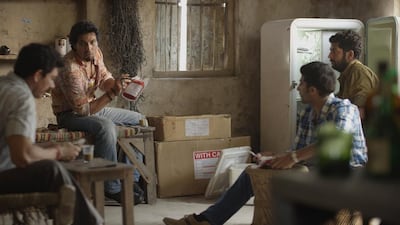In a cut-throat industry that can leave an actor on the scrapheap after a single box-office flop, Randeep Hooda managed to stick around for nine years before making it big.
The 39-year-old hunk, who made a promising debut with Mira Nair's Monsoon Wedding in 2001, had to wait four years for his next film, Ram Gopal Varma's D, and a further five for his first commercial hit, the gangster drama Once Upon a Time in Mumbaai (2010), for which he picked up a much-deserved Lions Gold Award for Favourite Actor in a Supporting Role.
He attributes his tenacity and determination to his heritage. Though he has lived in Mumbai, the seat of Bollywood, for 15 years, his roots are in Rohtak, Haryana, and he strongly identifies as Haryanvi.
“Haryanvi people have been through some very difficult times,” he says during a visit to Dubai last week. “They have developed a tough exterior and a very off-hand sense of humour to counter it.”
For his new film, the social drama Laal Rang (The Colour Red), which is in cinemas from tomorrow, Hooda takes inspiration from his home state.
“This was the first time I was getting to play my own ethnicity in a film,” he says. “I have spoken all kinds of dialects for movies, and initially I thought it would be easy to speak my own dialect. But after the first day of shoot, I realised that I have lived in Bombay for 15 years, and have studied abroad for another six years. So when it came down to actually doing it, I had to go back to my hotel room and recall my college days, my childhood days and talk to people on the phone in Haryanvi all over again.”
The film is directed by Syed Ahmed Afzal and produced by Nitika Thakur or Krian Pictures. Also starring Akshay Oberoi and Piaa Bajpai, it is about the illegal trade in human blood, which Hooda calls “the most heinous crime on Earth”.
“We all need blood [donations] at some point of time in our lives,” he says.
“It is a precious life source, and therefore the most heinous crime is not smuggling, not trafficking, not drugs, but this.
“In India there is this mentality that if you donate blood you will become ‘weak’. But blood banks don’t let you buy blood. You need to replace blood with blood. So what happens is that people buy blood from the poverty-stricken, for, say, 500 rupees [Dh27] and will sell it for 10,000 rupees.
“This is a social evil that is prevalent throughout India, but nobody has brought it to light in cinema until now.”
Despite the serious subject matter, however, the film is not all doom and gloom.
“The movie is not morose,” says Hooda. “It’s based on a true incident that happened in 2002 and it’s been written by a guy who has worked in a blood bank, but it’s laced with a lot of Haryanvi-style humour, which elicits a lot of laughs.
"If you look at recent films, one of the most endearing characters is the hilarious Datto [portrayed by Kangana Ranaut] in Tanu Weds Manu Returns, whose entire 'attitude' is Haryanvi."
Hooda says the character he plays in Laal Rang is flamboyant.
"I have played all kinds of roles," he says, "but never played someone so out there. Charles Sobhraj from Main Aur Charles was flamboyant but he was reserved and cunning – Shankar is happy-go-lucky."
Another first for Hooda was the chance to sing. He features on the song Kharch Karod with Haryanvi rapper Fazilpuria, whose track Kar Gayi Chull from the recent blockbuster Kapoor & Sons remains at the top of Indian music charts.
“Singing was a bizarre experience,” Hooda says with a laugh. “Rapping is not easy, let me tell you that. The rest of the music is also great. French composer Mathias Duplessy has created a whole new genre for the film: Haryanvi reggae. And Vipin Patwa has created Haryanvi rap.
“Even the way the film has been shot and packaged is very unique. It’s based on crime but it’s an interesting, entertaining film that will engage you emotionally.”
• Laal Rang is out in cinemas tomorrow
artslife@thenational.ae

